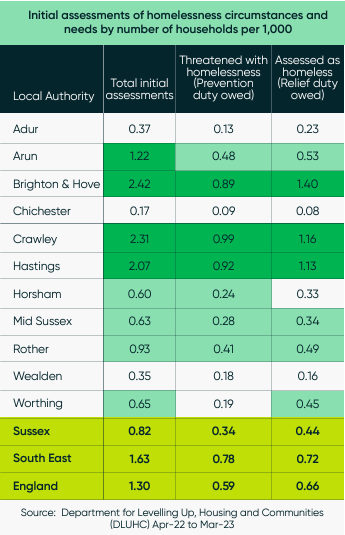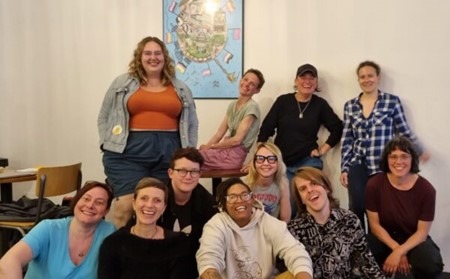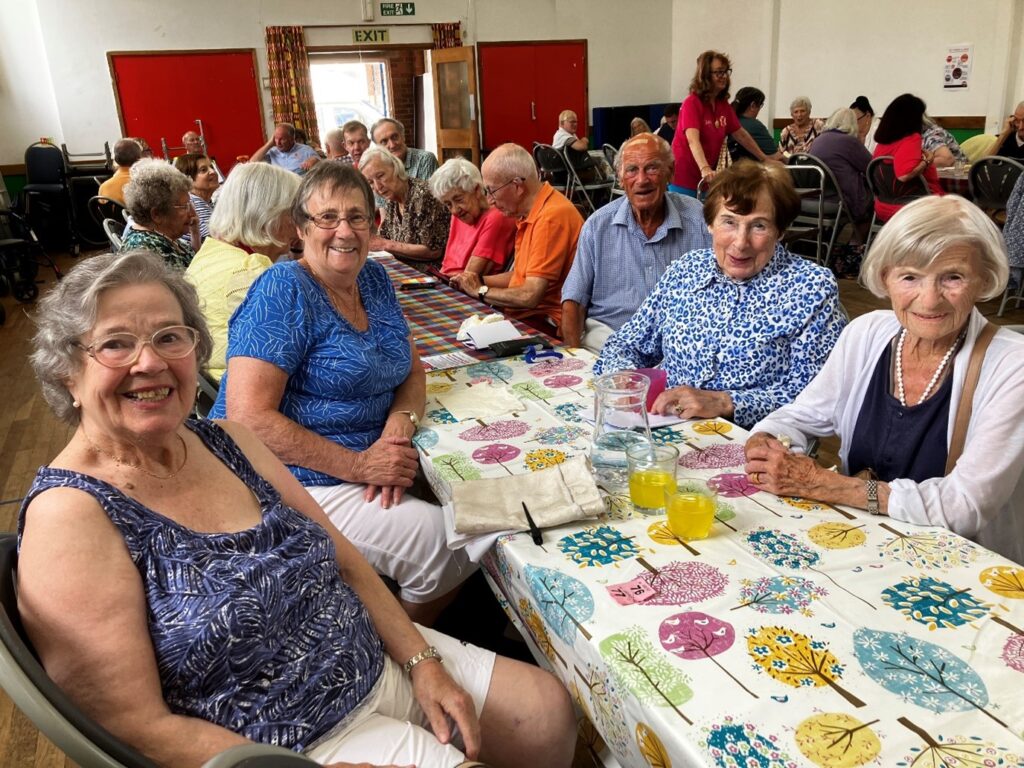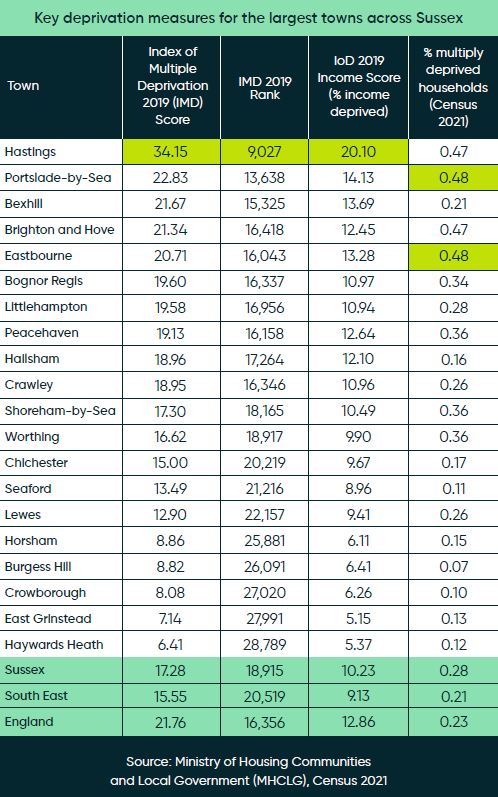Spotlight on... Worthing
From a small fishing village, Worthing became a stylish seaside resort in Georgian times, attracting wealthy holidaymakers from all over England. Today, Worthing is still a very popular tourist destination.

However, we learnt from our recent Tackling Poverty report that many Worthing residents are experiencing significant levels of deprivation. This is a common trend for most coastal communities in Sussex, where poverty rates are notably high.
In this article we focus on the main challenges affecting the town of Worthing and its residents.
A large number of rough sleepers
In Sussex, the top three Local Authorities for the number of people rough sleeping on a ‘typical night’ - by a significant margin are Brighton & Hove (41), Hastings (34), and Worthing (31).
Case study
SHOUT Worthing Soup Kitchen
SHOUT Worthing Soup Kitchen works with people experiencing homelessness, those in food poverty, and others living in temporary accommodations without cooking facilities. They provide a pop-up food bank alongside a food parcel service weekly for those in need. Talking about their latest project, they said: “The lives of those we support have improved by opening our hub. It has enabled those who were struggling and in food poverty to access food. We have been able to provide a selection of fresh food every Friday through our community fridge for those in need to access."
We recently heard the story of one of their beneficiaries:
“D is a young woman who had never worked and lived in one of our homeless projects in Worthing. She was younger than the other residents, had no work skills and lacked the confidence to approach a work situation. After a little encouragement D finally took the initiative and walked through our door. Under the careful guidance and tuition we provided, D gained a Food Hygiene Certificate Level 2 which eventually led her to secure a part time job in a local café. We are so proud of her. We have watched her learn, grow and blossom and she still will make time to volunteer here when she is free. This is the outcome we had hoped for.”
The challenge of fuel poverty
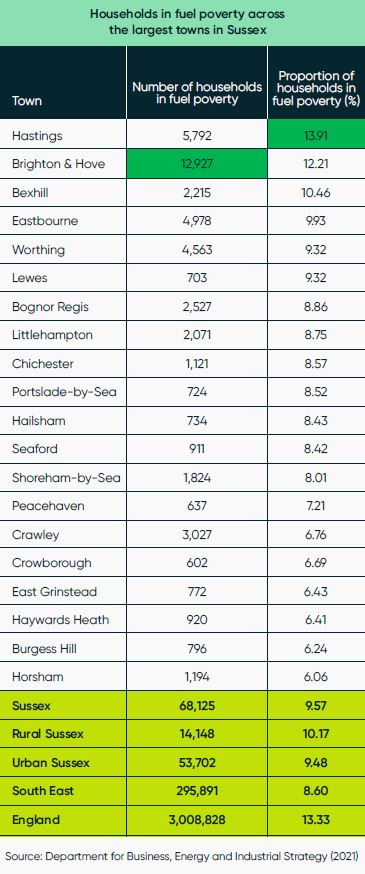
Sussex has a higher proportion of households in fuel poverty (9.6%) compared to the South East (8.6%) - the highest concentration can be found in the larger coastal towns, where a relatively high number of old housing stock is likely to contribute to additional heating costs. As mentioned before, these areas also have a relatively high proportion of low-income households. Worthing has a percentage of 9.32% of households in fuel poverty (4,563).
Case study
Adur East Lions Club CIO
The Club supports those living locally who struggle with poverty and/or disadvantage. They run a project to financially support those in fuel poverty in the local community.
“I have been struggling with depression and anxiety for a while and the whole Covid/Cost of Living crisis just made me want to check out. No one’s life should be this hard every single day. A friend told me about the ‘fuel support’ available from the Lions Club. Once I was warm and eating well again, I felt able to call the fuel company. I still get letters threatening to take me to court but, were it not for that extra support, I may have never phoned up and negotiated an acceptable repayment plan.” (Beneficiary)
“I have been told of several instances where people were about to be cut off by their energy supplier. Through our support they were able to work out payment plans or other arrangements to keep them connected.”
(Member of staff)
Case Study
St Matthew’s Church Worthing
The Foundation’s grant helped St Matthew’s Church operating a “Warm Space Café” two days a week, offering a welcoming environment to the local community. They also opened a foodbank and provided weekly hot lunches during the school holidays.
“One of the ladies attending our café originally found out about us through our foodbank. She had a troubled past and was living in a women’s refuge in Worthing. At the café she met many of our regulars and has since said how much better life is for her through the friends she has made. She now helps as a volunteer for us, which is a remarkable turnaround for her.”
“Increased energy costs have had a huge impact on the church and without the Foundation’s support it is unlikely we could have continued to operate during the winter months and be designated as a ‘Warm Space’ by Worthing Council.”
High percentage of over 65 years
Worthing has a high percentage of over 65 years – 22.36%, which is significantly higher than in the South East (19.45%) and England (18.41%). With the projected population change between 2020 and 2040 showing the over 65 years jump up to 40.49%, this will have increasing impact in Worthing and right across Sussex.
Alongside these predicted increases, we are seeing potential drops in the 0-15 years population which are likely to present a set of challenges. From rising social care and poor health burdens, to issues involving the labour market, these challenges are likely to lead to further increases in poverty.
Case Study:
Time to Talk Befriending
Time to Talk Befriending are a frontline service aiming to support lonely and isolated older people aged 65 and above. They organise group meet ups and one-to-one intergenerational befriending, with enhanced support for people living with dementia and suffering from mental health issues. They work in Worthing, Adur and Brighton & Hove.

“After her husband’s death, Mavis was very isolated and felt extremely lonely. We matched Mavis with a befriending volunteer, Anna. Mavis said: ‘Things were lonely before, but now I have Anna. Anna feels like a kindred spirit, she lifts me up and brightens my day. It is especially lovely during school holidays when Anna brings her little girl along.' Mavis also loves attending our monthly social get together. It gives her a reason to get out of the house and meet people, and she particularly enjoys chatting with our staff and volunteers. The free transport gives her reassurance that she can get safely to the venue and home again.” (Member of staff)
"Our staff are spending a huge amount of time on signposting and referral services, which go beyond our traditional befriending model. We estimate that approximately 50% of this additional workload is down to the Cost of Living crisis and aftermath of the Covid pandemic, which has had a direct impact on our scheme members physical health, mental health and emotional wellbeing."
Member of staff
How you can help
Our Tackling Poverty report highlights the desperate need in parts of Sussex and tells the story of why more local giving is essential, to increase support for people in our county.
Get in touch with the Philanthropy team to discuss how you can help make a difference in Worthing and the surrounding area, or you can donate directly to our Tackling Poverty Fund here.

